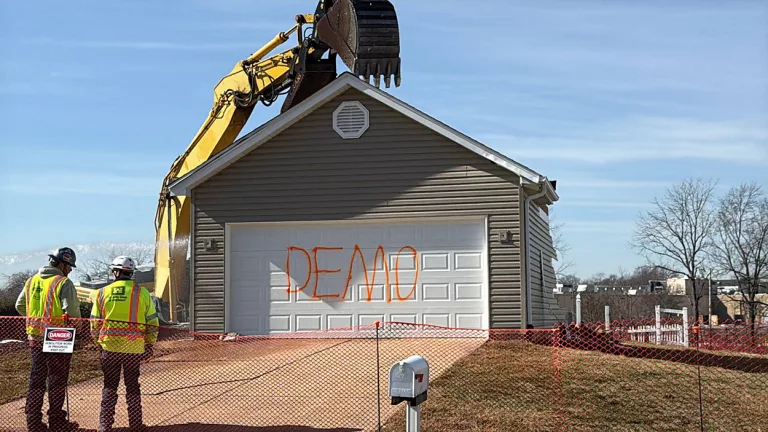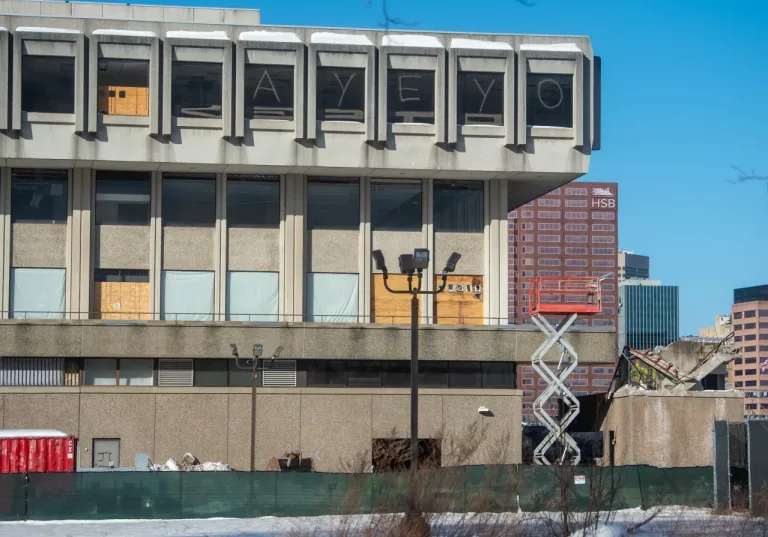
After a demolition at a former coal-fired power plant caused a thick cloud of dust to blanket the Little Village neighborhood in April, the site’s developer and its contractors have agreed to pay $370,000 to settle a lawsuit filed by the state. Northbroook-based Hilco Redevelopment Partners will pay the bulk of the funds under a settlement announced Thursday with Illinois Attorney General Kwame Raoul. The funds will go to Access Community Health Network’s Little Village health center to help address long-term health concerns in the community, including asthma, diabetes and high blood pressure.
But some in the community say it’s not enough.
Dr. Howard Ehrman, co-founder of Mi Villita, a neighborhood organization in Little Village focused on informing residents about development projects, said the amount Hilco agreed to was “chump change,” and more could have been done to ensure the needs of the community were met after the demolition.
On April 11, Hilco demolished a 378-foot smokestack on the property that caused a dust cloud to blanket the area as hundreds of Little Village residents sheltered at home to quell the spread of the novel coronavirus. The settlement resolves a May 5 lawsuit Raoul filed in Cook County Circuit Court alleging Hilco and its contractors violated the state’s air pollution laws with the demolition. Ehrman, 73, who lives about a half a mile from the site, said he woke up the morning of the demolition to a “huge thunderous noise.”
Ehrman, who served as assistant commissioner of health under former Mayor Harold Washington, said he rode his bike to check out the scene, but had to go back home because the dust made it hard to see. “Thousands of people who live four blocks (away from the site) got exposed. We don’t know what the consequences are. We haven’t done an epidemiological study,” Ehrman said about the need to conduct a study on the long-term effects.
About half of Little Village’s residents are uninsured and some are living in the country without legal permission, he said. The state could have directed the use of the funds from the settlement to test residents’ respiratory function, he said.
Hilco Redevelopment Partners is required to pay $250,000 under the settlement. Subcontractors MCM Management and Controlled Demolition will pay $60,000 each. The settlement also requires Hilco and its contractors to comply with dust mitigation plans for the remainder of the demolition project.
[Most read] Goodbye Vista Tower, hello St. Regis. Chicago’s newest skyscraper has a new name, new hotel and a restaurant deal with Alinea Group. »
Edith Tovar, a community organizer for Little Village Environmental Justice Organization, said no amount of money offered in a settlement could change the trauma and damage caused to the community. Tovar said parts of Chicago’s Pilsen and North Lawndale neighborhoods were also affected. “It’s hard to explain to Hilco and the city of Chicago that Little Village residents weren’t the only ones impacted. Air is not stagnant. Air travels. It doesn’t stay in one place,” she said.
The demolition occurred at a time when many hospitals were dealing with COVID-19 patients. Almost all emergency room patient visits from April 11-13 at Mount Sinai Hospital in the nearby Douglas Park neighborhorhood were attributed to respiratory issues, spokesman Dan Regan said via email. Mayor Lori Lightfoot in April called the demolition “utterly unacceptable.”
Little Village leaders and some aldermen called on Lightfoot to strip Hilco of its $19.7 million in tax subsidies after the demolition. Last month, City Council approved an ordinance that would take away tax incentives in the future from developers who fail to comply with environmental rules and other city regulations.
[Most read] Chicago Bears Q&A: If this team is a QB away from contending, why not sell out in the 2021 draft to get one? And which Bears players have a realistic shot at the Pro Bowl? »
The ordinance is not retroactive and won’t affect Hilco, Tovar said.
The demolition is part of a $100 million project that will redevelop the former Crawford Power Generating Station, which has been shuttered since 2012 after a push by activists, into a 1.06-million-square-foot warehouse. Hilco nor its subcontractors responded to requests for comment.
ab*******@************ne.com




